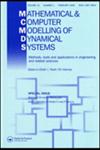时变几何管中不可压缩流的流体结构端口哈密顿模型
IF 1.8
4区 数学
Q3 COMPUTER SCIENCE, INTERDISCIPLINARY APPLICATIONS
Mathematical and Computer Modelling of Dynamical Systems
Pub Date : 2020-07-03
DOI:10.1080/13873954.2020.1786841
引用次数: 4
摘要
摘要基于端口哈密顿框架,提出了一个简单且可扩展的有限维模型来描述具有时变几何形状的管道中的流体-结构相互作用。为此,移动管壁由一组质量弹簧阻尼系统描述,而流体被视为一维不可压缩流,由一组不可压缩流动段中的平均动量动力学描述。为了耦合这些流动部分,定义了小的可压缩体积来描述两个相邻流体部分之间的压力。流体-结构耦合是通过速度和力之间的功率保持互连来实现的。所得模型包括流体的外部输入和机械部件上的外力的输入,这些外力可用于控制或互连目的。数值算例表明了该简化模型与文献中报道的有限元模型的一致性。本文章由计算机程序翻译,如有差异,请以英文原文为准。
Fluid-Structure Port-Hamiltonian Model for Incompressible Flows in Tubes with Time Varying Geometries
ABSTRACT A simple and scalable finite-dimensional model based on the port-Hamiltonian framework is proposed to describe the fluid–structure interaction in tubes with time-varying geometries. For this purpose, the moving tube wall is described by a set of mass-spring-damper systems while the fluid is considered as a one-dimensional incompressible flow described by the average momentum dynamics in a set of incompressible flow sections. To couple these flow sections small compressible volumes are defined to describe the pressure between two adjacent fluid sections. The fluid-structure coupling is done through a power-preserving interconnection between velocities and forces. The resultant model includes external inputs for the fluid and inputs for external forces over the mechanical part that can be used for control or interconnection purposes. Numerical examples show the accordance of this simplified model with finite-element models reported in the literature.
求助全文
通过发布文献求助,成功后即可免费获取论文全文。
去求助
来源期刊
CiteScore
3.80
自引率
5.30%
发文量
7
审稿时长
>12 weeks
期刊介绍:
Mathematical and Computer Modelling of Dynamical Systems (MCMDS) publishes high quality international research that presents new ideas and approaches in the derivation, simplification, and validation of models and sub-models of relevance to complex (real-world) dynamical systems.
The journal brings together engineers and scientists working in different areas of application and/or theory where researchers can learn about recent developments across engineering, environmental systems, and biotechnology amongst other fields. As MCMDS covers a wide range of application areas, papers aim to be accessible to readers who are not necessarily experts in the specific area of application.
MCMDS welcomes original articles on a range of topics including:
-methods of modelling and simulation-
automation of modelling-
qualitative and modular modelling-
data-based and learning-based modelling-
uncertainties and the effects of modelling errors on system performance-
application of modelling to complex real-world systems.

 求助内容:
求助内容: 应助结果提醒方式:
应助结果提醒方式:


